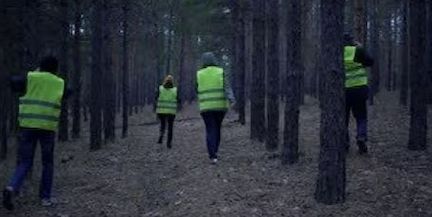The Petulant Petrel
Isn't this exactly what we do when we're feeling attacked? In our defensive response we go all “petrel” on our attacker, verbally vomiting our wrath right into their face. And if we're forceful enough perhaps, like the Petrel, we'll knock them down.
This is certainly crude, but is it the most effective way of dealing with human conflict?
“A gentle answer turns away wrath, but a harsh word stirs up anger” (Proverbs 15:1). … ”A hot-tempered man stirs up dissension, but a patient man calms a quarrel” (Proverbs 15:18).
You Need To Know You're Lost If You Want To Be Found
In 2021, a Turkish man named Beyhan Mutlu was reported missing after he wandered into a forest while drinking with friends. His wife and friends alerted authorities, and a search party was formed. Unaware that he was the subject of the search, Mutlu stumbled upon the group and decided to help them look for the "missing person." After hours of searching, he finally realized they were calling out his own name and responded, "I am here."

When he was taken aside by one of the rescuer workers to give a statement, he said, "Don't punish me too harshly, officer. My father will kill me."
One of the greatest challenges of evangelism is convincing the "lost" that they are indeed lost. So given to reiliance on our own "self"-righteousness, we find it nearly impossible to admit we actually need a Savior.
Yet the Lord persists in hunting us down, wooing us, calling our names.
"If a man has a hundred sheep and one of them wanders away, what will he do? Won’t he leave the ninety-nine others on the hills and go out to search for the one that is lost?" (Matthew 18:12, NLT).
"For the Son of Man came to seek and save those who are lost" (Luke 19:10, NLT).
Like poor Beyhand Mutlu, "We all, like sheep, have gone astray, each of us has turned to our own way ..." We're all spiritually intoxicated, staggering around in the woods not even aware that we need help.
Yet, He IS calling you! So, “Today, if you hear his voice, do not harden your hearts as [Israel] did in the rebellion" (Hebrews 3:15, NIV). They'll be no angry father awaiting you, only the warm embrace of grace from the arms of the Savior.
Know Your Value
Take out a new crispy $10 bill and ask the students or congregation what you are holding . Ask if anyone would like it. All would raise their hands. Then take a another $10 bill out of your pocket that is dirty and crinkled up and ask what you are holding now. Ask if anyone would like to have it. All would raise their hands again.

Each one of us is so valuable! We were made in the image of God (Genesis 1:27). Just like the $10 bill didn't lose its value and was still worth $10 no matter how dirty it was, so too our value doesn't change even though we may have gotten dirty with sin. We need to look at ourselves through God's eyes, knowing that we are loved, we are chosen, we are the most precious creation of God!
Luke 12:6-7 says "Are not five sparrows sold for two pennies? And not one of them is forgotten before God." If God does not forget about the smallest of his creations, he certainly is not going to forget about you his son/daughter.
In 1John 3:1 it says "Behold what manner of love the father has bestowed on us, that we should be called children of God." We are his children made in his image.
The problem isn't us losing our value (child of god), it's us not realizing our value at times.
Just like the $10 no one minded when I asked the question would you still take the $10 that was all squished up and dirty because the knew the value. The value does not diminish because of the circumstances it was in. It could be a crispy new $10 bill, an old one that is a little ripped, one that is a different older design, one that has been used a lot or a little. They all are worth $10.
My prayer is that you live with the knowledge of knowing your true value and don't let someone else or your circumstances dictate what your value is. The $10 only gets its value from one place: the US Treasury when they printed it. If I told you that the $10 in my hand is actually $5 you wouldn't believe. In that same sense, don't let others or the devil fool you about your true value.